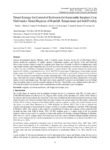Timed Strategy for Control of Bollworm for Sustainable Sorghum Crop Yield under Varied Regimes of Rainfall, Temperature and Soil Fertility

View/
Date
2016Author
Mutisya, Daniel L.
Khamala, Canute P. M.
Konyango, Jacob J. J. O.
Kamau, Clement K.
Matolo, Lawrence K.
Metadata
Show full item recordAbstract
Various environmental factors influence yield of sorghum grain, Sorghum bicolor (L) in Sub-Sahara Africa. Various production conditions of rainfall amount, temperature regimes, soil fertility levels and bollworm Helicoverpa armigera density at specific sorghum grain stage were evaluated for effect to sorghum grain yield. High rainfall amount, high temperature and soil fertility levels were positively correlated to sorghum grain yield at three test sites at Ithookwe, Katumani and Kampi of eastern Kenya. The warmest Kampi site achieved the highest seed viability on germination test at 43, 87 and 99% for grain stage of light-green, cream-dough and hard dough, respectively. High H. armigera density was inversely correlated to grain yield. Comparatively, yield loss of < 10% was observed when grain was at early soft dough and > 35% as the grain ripened to early hard dough stage. Thus initial H. armigera damage occurred at late soft dough stage and increased exponentially as the grain ripened to early hard dough stage. The right time to spray against H. armigera was determined as at soft dough stage of sorghum grain to prevent economic damage of the crop. Thus fertility level, rainfall amount and time of bollworm pest attack were deemed worth considerations towards sustainable yield of sorghum
